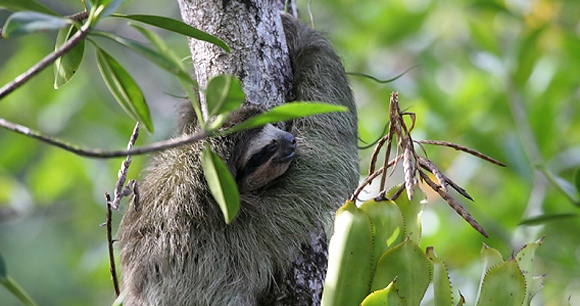
Washington, DC—The US Fish and Wildlife Service (USFWS) has proposed listing the pygmy three-toed sloth under the Endangered Species Act in response to a 2013 emergency petition filed by the Animal Welfare Institute (AWI).
The pygmy three-toed sloth (Bradypus pygmaeus) is the world’s smallest sloth species. On Tuesday, the USFWS proposed listing the species as threatened, determining that the pygmy sloth is likely to become endangered in the foreseeable future throughout its range due to habitat loss and degradation from timber cutting and development, overutilization by humans, loss of genetic diversity, and inadequate existing regulations.
The agency also proposed adopting a special “4(d) rule” to provide additional protections to the species. The USFWS’s proposed protections include prohibiting import, export, take (including capture, hunting, and harassment), possession, and sale of the species, and interstate or foreign commerce in the species by those subject to US jurisdiction, with certain exceptions. The USFWS is accepting comments on the proposal through May 28.
“Today’s proposal to list the pygmy three-toed sloth under the ESA is welcome news for this species that is declining due to destruction of its forest habitat, hunting, and commercial exploitation, including capture and harassment for ‘sloth selfies’ by tourists,” said DJ Schubert, senior scientist in wildlife biology at AWI.
Pygmy sloths were first identified as a distinct sloth species in 2001. Since 2006, the species has been classified as “critically endangered” on the International Union for Conservation of Nature Red List.
AWI filed an emergency petition in November 2013 with the USFWS to list the pygmy sloth as endangered, leading the agency to initiate a review of the pygmy sloth’s status. The petition was filed two months after the Dallas World Aquarium captured at least eight pygmy sloths in Panama, intending to send six to its facility in Texas and two to a Panamanian zoo, despite evidence that the species does not survive well in captivity. Concerned citizens, animal advocates, and local authorities thwarted the aquarium’s plans, but at least two of the captured sloths died before they were released back into the wild.
Marjorie Fishman, Animal Welfare Institute
(202) 446-2128, [email protected]
The Animal Welfare Institute is a nonprofit charitable organization founded in 1951 and dedicated to reducing animal suffering caused by people. AWI engages policymakers, scientists, industry, and the public to achieve better treatment of animals everywhere: in agriculture, in commerce, in our communities, in research, and in the wild. Follow us on Facebook, X (formerly Twitter), and Instagram for updates and other important animal protection news.